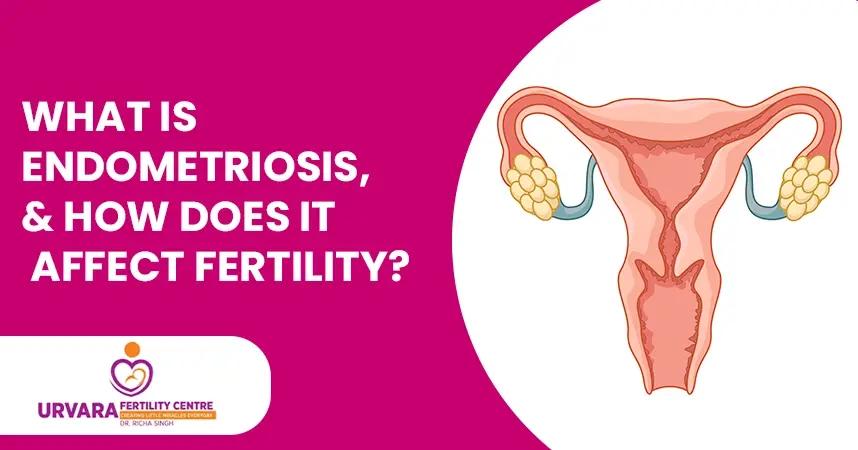
What is Endometriosis, and How Does it Affect Fertility?
Endometriosis is a condition that affects millions of women worldwide but is often undiagnosed or misdiagnosed. It involves the growth of tissue similar to the uterine lining (endometrium) outside the uterus, causing pain, irregular menstrual periods and fertility problems. If you’re having difficulty conceiving or dealing with painful menstrual cycles, understanding endometriosis can provide clarity and guidance.
This article explains what endometriosis is, how it affects fertility, and what treatments are available for it. Whether you suspect you have endometriosis or you're looking for information for a loved one, this guide will provide valuable information about this condition and its management.
Understand Endometriosis
Endometriosis occurs when tissue similar to the lining of the uterus begins to grow outside the uterus, usually on the ovaries, fallopian tubes, and surrounding pelvic organs. This tissue thickens, breaks down and bleeds during each menstrual cycle but has no way to exit the body. This leads to inflammation, scar tissue and cysts.
Key Symptoms of Endometriosis
-
Painful periods (dysmenorrhea)
-
Chronic pelvic pain
-
Pain during intercourse
-
Heavy or irregular periods
-
Difficulty conceiving (infertility)
-
Fatigue, bloating, or nausea
Read Also:- Improve Endometrial Thickness for IVF Success
How Does Endometriosis Affect Fertility?
Endometriosis can affect fertility in a variety of ways, including:
-
Distorted Anatomy of the Reproductive Organs: The scarred tissue and adhesions caused by endometriosis can distort the structure of the ovaries, fallopian tubes, and uterus, making it difficult for eggs to move forward.
-
Blocked Fallopian Tubes: Cysts or scarred tissue can block the fallopian tubes, preventing the egg from meeting the sperm.
-
Inflammation and Immune Response: The long-term inflammation caused by endometriosis can alter the environment necessary for fertilization and implantation.
-
Impaired Egg Quality: Endometriosis can reduce the ovarian reserve or egg quality, which may affect the chances of successful conception.
-
Hormonal Imbalance: This condition can interfere with hormone production, which may disrupt ovulation and implantation.
Diagnosis of Endometriosis
Diagnosing endometriosis can be challenging because the symptoms vary widely among women. Common diagnostic methods include:
-
Pelvic Exam: To check for abnormalities.
-
Ultrasound: To detect cysts or other signs.
-
MRI: For a detailed view of the pelvic region.
-
Laparoscopy: A minimally invasive surgery that confirms the presence and severity of endometriosis.
Treatment Options for Endometriosis
Treatment depends on the severity of the symptoms and whether you are trying to conceive or not.
1. Pain Management
-
Over-the-counter pain relievers like ibuprofen.
-
Prescription medications for severe cases.
2. Hormonal Therapy
-
Birth control pills to regulate periods and reduce symptoms.
-
Gonadotropin-releasing hormone (GnRH) agonists to shrink endometrial tissue.
3. Surgery
-
Laparoscopic Surgery: Removes endometrial tissue to improve fertility.
-
Hysterectomy: Reserved for severe cases when childbearing is no longer a goal.
4. Assisted Reproductive Technologies (ART)
-
In vitro fertilization (IVF) bypasses many fertility issues caused by endometriosis.
5. Lifestyle Changes
-
A balanced diet and regular exercise can help manage symptoms.
Steps to Take If You Have Endometriosis and Are Trying to Conceive
-
Consult a Fertility Specialist: An initial evaluation can determine the best treatment option.
-
Track Ovulation: Use ovulation predictor kits to optimize timing.
-
Consider ART: Treatments such as IVF can increase your chances of pregnancy.
-
Adopt a Healthy Lifestyle: Stress reduction, proper nutrition, and exercise can boost overall fertility.
Read Also:- Know Everything About IVF Cycle
Frequently Asked Questions (FAQs)
Q1. Can I get pregnant with endometriosis?
Yes, many women with endometriosis conceive naturally. However, others may need medical intervention such as surgery or IVF.
Q2. Is endometriosis a lifelong condition?
Endometriosis is a long-term disease, but its symptoms can be controlled through medication, surgery, and lifestyle changes.
Q3. Does pregnancy cure endometriosis?
Pregnancy may temporarily ease symptoms but does not cure the condition. Symptoms may return after the baby is born.
Q4. What foods should I avoid with endometriosis?
Limit your intake of processed foods, red meat, and high-fat dairy products. Focus on anti-inflammatory foods like leafy vegetables, fish, and nuts.
Q5. How can I reduce the pain of endometriosis?
Pain can be controlled with medications, heat therapy, relaxation techniques and yoga.
How to Manage Life with Endometriosis?
Living with endometriosis can be challenging, but active management can make a significant difference. Regular consultations with your doctor, maintaining a healthy lifestyle, and seeking support from communities or counselling can help you deal with the condition effectively.
Conclusion
Endometriosis is a complex condition that can significantly impact a woman's quality of life and ability to conceive. However, with timely diagnosis, appropriate treatment, and lifestyle changes, it is possible to manage symptoms and improve fertility outcomes. If you suspect you have endometriosis, consult with Urvara Fertility Centre to explore your options and take control of your reproductive health.
Content Created By:

Cyberbizz Technologies
Team - Content Curator

